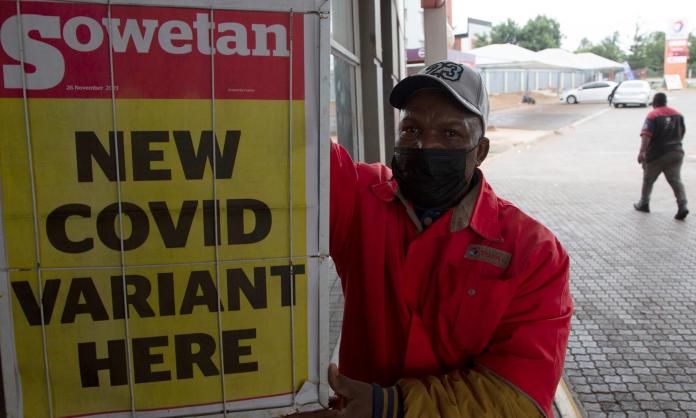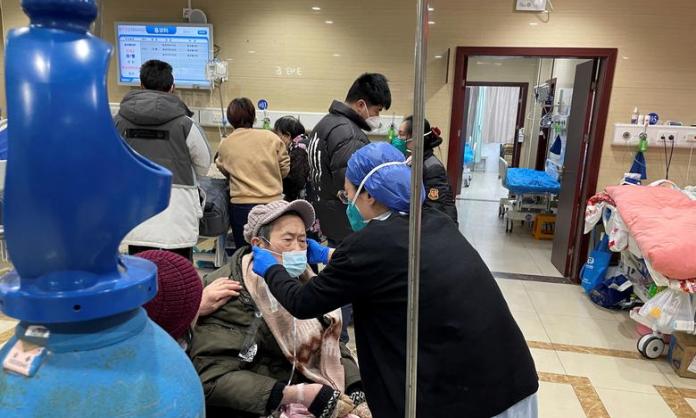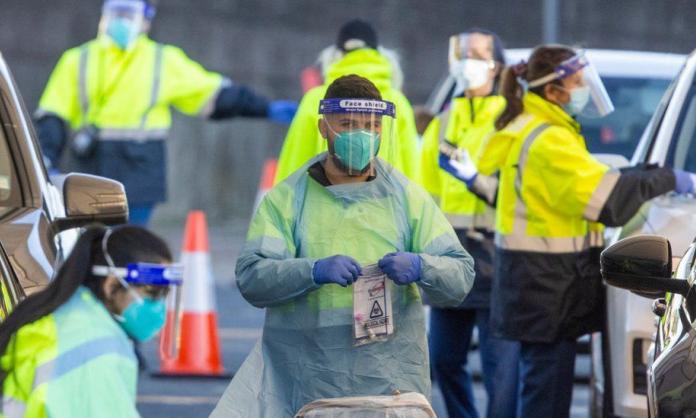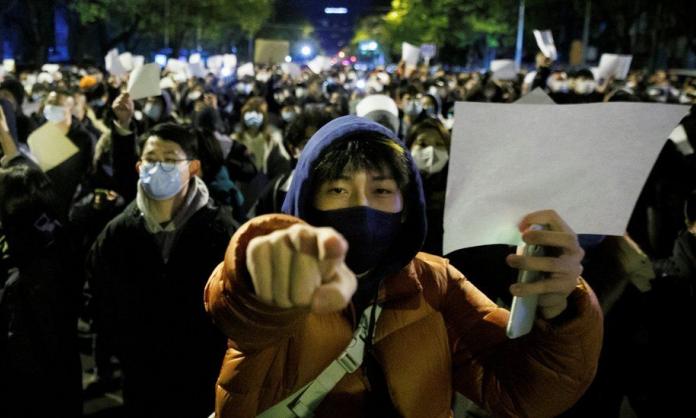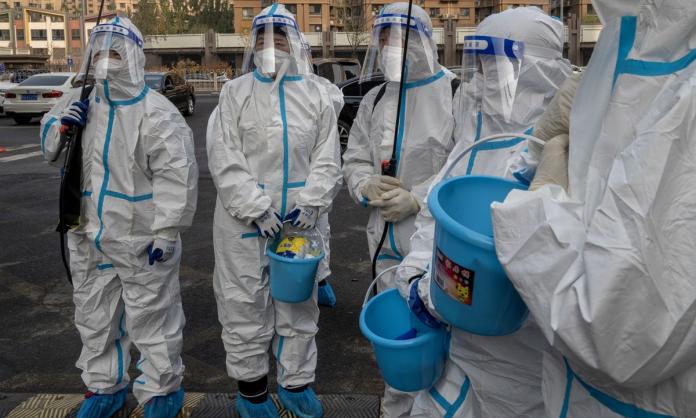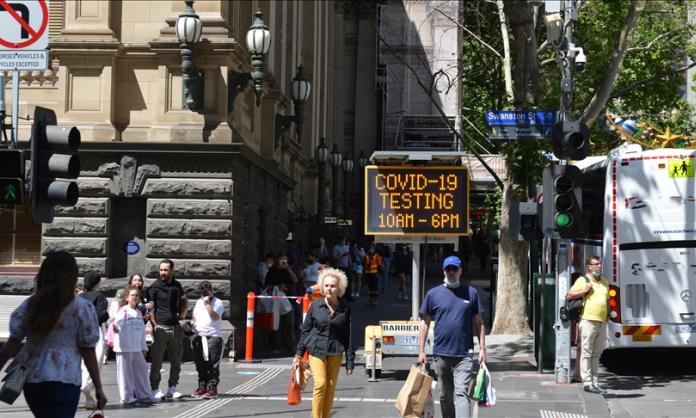The emergence of the Omicron variant has dented the narrative of many Western governments and media that the COVID-19 pandemic is a thing of the past.
There is much that we do not know about the new variant but, judging from the exponential rise in cases in South Africa and the variant’s rapid international spread, it seems to be more transmissible than previous strains. This, combined with early research suggesting that two doses of Pfizer vaccinations provide little protection against it, suggests that the appearance of Omicron constitutes a dangerous development.
Scientists have been warning governments about the threat of new variants since the beginning of the pandemic. They make the development of proper pandemic infrastructure and public health measures a matter of urgency. But two years into the pandemic, governments are moving in the opposite direction.
The emphasis on the importance of restoring economic “normality”, “living” with the virus and downplaying its ongoing impact on the part of most governments has brought with it a level of official complacency. Governments are not well placed to get back on the front foot in imposing health measures in response to a new variant, a situation which imperils us all.
Despite around 19 million people having lost their lives to COVID-19 over the last two years, the measures needed to minimise the death toll have simply not been put in place.
The rapid spread of Omicron in Southern Africa and the speed at which it has crossed national borders only confirms the truth of what serious epidemiologists have been saying since the start of the pandemic: that none of us is safe until all of us are safe.
In low-income countries, just 6 percent of people have received even one dose of a COVID-19 vaccine, as against the wealthier countries, where 75 percent or more is the norm. In many poorer countries, even health care workers have not yet been vaccinated.
To ensure we are all safe, vaccination must be as widespread as possible. A massive program to vaccinate the world, ensuring the 3.5 billion people who have not yet received a single dose are urgently vaccinated, is what is needed. To achieve that, there must be cooperation across international borders and a commitment to equitable distribution of vaccines. Early in the pandemic, the governments of the rich countries committed to this. The COVID-19 vaccination access program (COVAX) was meant to ensure a degree of equity in vaccine access. But the fine words have come to virtually nothing. Of the two billion doses promised for 2021, only 300 million had been delivered by the end of September, a drop in the ocean.
Far more common is countries diverting supplies meant for the COVAX program towards domestic use or to markets where they can get a higher return. Instead of setting up public enterprises to manufacture the vaccines in sufficient quantity and at low cost, governments have simply thrown money at private pharmaceutical companies that have no interest in donating supplies to poorer countries.
Vaccinating the world means breaking the monopoly exercised by these companies over manufacturing COVID-19 vaccines. And it means scrapping the patent system that prevents the sharing of knowledge which could be used to protect people in a pandemic.
Right from the outset of the pandemic, the big companies have refused demands by the Indian and South African governments, along with a host of medical associations and professional bodies, to waive their intellectual property rights on vaccine manufacture to allow others to manufacture or import cheaper generic versions.
When it comes to who gets the vaccines, money doesn’t talk, it screams. In the anarchic system that is capitalism, the distribution of life-saving drugs is determined squarely by profit. These pharmaceutical companies and the bought and paid for politicians sometimes try to point the finger at “vaccine hesitancy” in Southern Africa to explain the low rates of coverage. But the real “hesitancy” is that of these companies that refuse to accept a hit to their profits in the interests of public health. This is callous indifference to the fate of billions of people in poorer countries around the world.
Ensuring that the world is vaccinated is not just a matter of international solidarity. The longer the virus is allowed to circulate, the more likely it is to mutate into new strains that overcome existing vaccinations in those countries where the population is now highly vaccinated. The Omicron variant appears to be an example of this.
The governments of the richer countries are well aware that allowing COVID-19 to spread freely among billions of people in the poorer countries will eventually rebound on their own populations. But they’re willing to take that risk because public health, even of their own people, is not their top priority.
As COVID-19 spread across the world in early 2020, the instinct of most governments was to try to keep business and borders open and to brazen it out no matter the cost in lives. And that’s just what happened in many cases. The politicians simply did not care as the bodies piled high. People were expendable. Only in a few cases did governments feel compelled to shut local and international borders and frustrate the free movement of capital and opportunities for profit making. The result was that COVID-19 was effectively eliminated by the year’s end in a small number of countries, including Australia and New Zealand. Even here, governments made sure that the capitalists were well compensated for their inconvenience, and the fortunes of the rich grew fantastically off the back of government subsidies and money printing.
The situation today, however, is that as COVID-19 cases increase once again around the world, most of those governments that did, briefly, end up eliminating COVID-19 have now abandoned this strategy and are winding back measures that were meant to remain in place to keep COVID-19 numbers down. They are now relying almost entirely on high vaccination rates. This approach leaves the population wide open to new global waves of the virus, what the politicians and chief health officers call “living with covid” and other inhuman terms. If fresh mutations occur as a result of failing to vaccinate the world, that might be inconvenient but it’s nothing to lose sleep over: the wheels of industry must keep turning.
A serious program to vaccinate the world would mean infringing on the sacred rights of Big Pharma to make money. This is just not what capitalist governments do. It would involve a fight not just with the chief executives and institutional shareholders of these companies but with the entire capitalist class. So, it’s not just a matter of the bottom line of a particular group of capitalists but the entire cosy relationship between governments and capitalists as a whole which must not be disturbed.
The emergence of Omicron exposes another weakness in our pandemic defences—the refusal of governments to construct proper quarantine facilities.
The waves of coronavirus that have swept through Sydney and Melbourne this year and last have their origins in inadequate quarantine facilities (including transportation to and from such facilities). Hotel quarantine is the obvious culprit. The Morrison government opted to put returned travellers into hotel quarantine in part because it was cheaper than building brand-new purpose-built quarantine facilities. The government could simply contract with hotel owners to take over their properties for months, use cut-price and barely trained security guards and hope for the best. Of course, the outcome was multiple, 20 at last count, COVID-19 leakages, resulting in thousands of people being infected. By contrast, there has not been one outbreak among the thousands of returned travellers who passed through the only purpose-built facility at Howard Springs in the Northern Territory.
Only this winter, 18 months after the virus entered Australia, did the federal government sign memoranda of understanding with the Western Australian, Victorian and Queensland state governments to build federally funded quarantine facilities, each at a cost of $200 million. These will not come into service until March or April next year at the earliest. The Morrison government’s penny-pinching is largely to blame, along with the reluctance of state governments to go ahead independently when the federal government dragged its feet.
But as with their refusal to vaccinate the world, cost is not the only consideration. After all, the $600 million the federal government is outlaying on three new quarantine centres is just a small fraction of the cost of disruption caused by the COVID-19 outbreaks since the start of the pandemic. Another factor is the Liberal government’s squeamishness about expanding public investment in publicly run infrastructure that is not narrowly geared to business making more money. Building quarantine facilities in every capital city would suggest that the government is prepared to take pandemics seriously which, as has become increasingly obvious as the pandemic rolls on, runs contrary to its instincts.
Even if Omicron turns out to be less of a threat than first feared, Delta is still inflicting terrible suffering and death, despite the official optimism about getting back to “normal”. Now in its fourth wave, case numbers globally have risen by 50 percent in the past six weeks to 600,000 per day. Deaths are still running at 7,000 per day. And both of these are just the official records, which lag well behind the actual numbers.
So, while there should be immediate and serious health measures imposed to meet the Omicron threat, so too should there be continuing measures to control the much more immediate threat posed by Delta. Yet the reopening plans in New South Wales and Victoria continue apace and are everywhere presented as something to celebrate.
The largely complacent response of most governments to the Omicron variant reflects the degree to which large-scale suffering and death has been normalised, and so long as the health systems don’t completely collapse, governments largely want to keep it that way. These governments stand condemned for their refusal to take anything but the most limited steps to confront the most serious pandemic the world has seen for a century. They are playing with our lives all to keep profits flowing into the coffers of big business.




